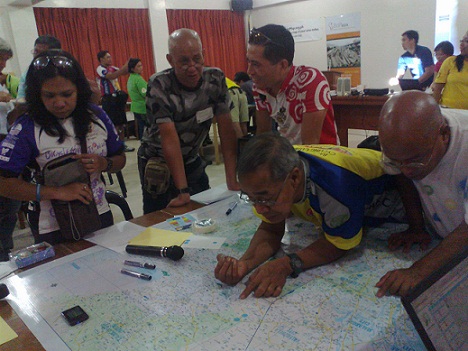By REYNARD MAGTOTO
AS a motorist, are you tired of being caught in the day-to-day traffic and continuous oil price hike?
Then why not try biking –an eco-friendly, cheap and efficient alternative mode of transportation.
Marikina, Pasig and other cities in Metro Manila have already caught the “biking bug.”
Some local government units are now active in advocating bicycling as a means of city transport, according to a recent forum and mapping workshop on non-motorized transport (NMT) at the Ateneo De Manila University.
For instance, the Marikina Bikeways Project that encourages residents to use bicycles around the city is well-supported by local legislation with $1.3-million funding from the World Bank and the Global Environment Facility.
Carlota Contreras, officer in charge of Marikina Bikeways, said the local government is trying to remove all barriers to bicycling. She said: “Binigyan (kami) ng pondo kasi daw mahal yung bikeways, may ordinansa kami para resputuhin ang bicycling, may enforcement group kami (We were given funds because bikeways are expensive, we have an ordinance to respect bicycling, we have an enforcement group).”
She said Marikina provides adequate and safe parking facilities for bikers, greater access to major transport channels, and includes bicycle lane construction in its regular infrastructure projects.
The bikeways established in Marikina are on Katipunan Road, Fortune Avenue, Gen. Ordoñez Street, J.P. Rizal Street, W. Paz Street, Shoe Avenue, Gen. Ordeñez Street to Marcos Highway, V. Santos Street, Katipunan Access Road, and on B.G. Molina Street.
For those who want to buy a bicycle, Marikina also lends money, one-year interest-free, through its Bicycle Loan Program as provided under City Ordinance 92 passed in 2004. The city offers a Bicycle Clinic every Saturday from 8 a.m. to noon, which gives safe cycling education to young students and women.
Aside from Marikina, Pasig City, Quezon City, and even Davao City in southern Philippines have ordinances and programs in support of bicycling.
Pasig has an ordinance that calls for the designation of bike lanes around the city and provides incentives for bikers as well as penalties for violators.
The city has a Bike to Work Loan Program, which anyone can avail of at zero interest as long as they live within two kilometers from the Pasig City Hall. It has already 250 beneficiaries.
It also has a Bike to Earn Loan Program for selected “poorest of the poor” in Pasig, who are given the chance to have a new padyak (a pedicab). Its Green Heart Padyak is a program of the Pasig City Environmental and Natural Resources Office that enables the poor to earn a living by using padyak in getting recyclable materials from houses.
“Ang padyak feeling ko hindi lang pang recreation at hindi lang pang bicycling; gusto namin syang i-transform for poverty alleviation (I feel that padyak is not only for recreation and bicycling; we would like to transform it for poverty alleviation),” Raquel C. Austria-Naciongayo, head of Pasig CENRO, explained.
The city of Pasig has been working with Firefly Brigade to carry out a bike plan program for city employees. The Firefly Brigade has the battle cry “share the road” to promote awareness of bicyclists.
Ma. Isabel C. Bunao, project coordinator of Firefly Brigade, said that if people always see groups of bicyclists, they are eventually acknowledged as part of the road system.
In Quezon City, the best places to ride a bike are inside the University of the Philippines campus in Diliman, La Mesa Park and La Mesa Eco Trail in Fairview, according to Erwin Paala, head of the Kaligtasan Kalusugan Kalikasan (KKK) Revolution.
He also identified the Fort Bonifacio Mountain Bike Trail in Makati City and Nuvali of Ayala Properties in Sta. Rosa, Laguna as best places for biking enthusiasts.
KKK is the bicycle advocacy group that supports LGUs in their long-term bike lane infrastructure projects. It also works closely with the Philippine Red Cross in its safety programs.
“Napili ko ang mga ito dahil safe and secure ang mga ito para sa mga bikers (I chose these places because they are safe and secure for bikers),” Paala said. “Madali lang hanapin ang mga ito (They are easy to find).”
Paala was among the NMT advocates who mapped bike shops, bike repair shops, bike hubs and other service centers at the recent NMT forum and mapping workshop to identify the opportunities cycling presents in the improvement of public transportation.
Joel Uichico, project manager of Bike for the Philippines (BfP), said they give free bicycles to the less fortunate to reduce the dropout rate of school children in partnership with Bike for the World (BFW).
The BFW has been running bicycle collection drives in Washington D.C. since 2005 and has donated more than 61, 000 bicycles to its 10 partner agencies in eight countries, including the Philippines.
The BFW also collects used bikes and other donated bikes from abroad and restores them in new condition in cooperation of the Philippine Army. So far, it has given 70 bicycles to selected less fortunate children.
(The author is a journalism student of Bicol University who is writing for VERA Files as part of his internship.)
